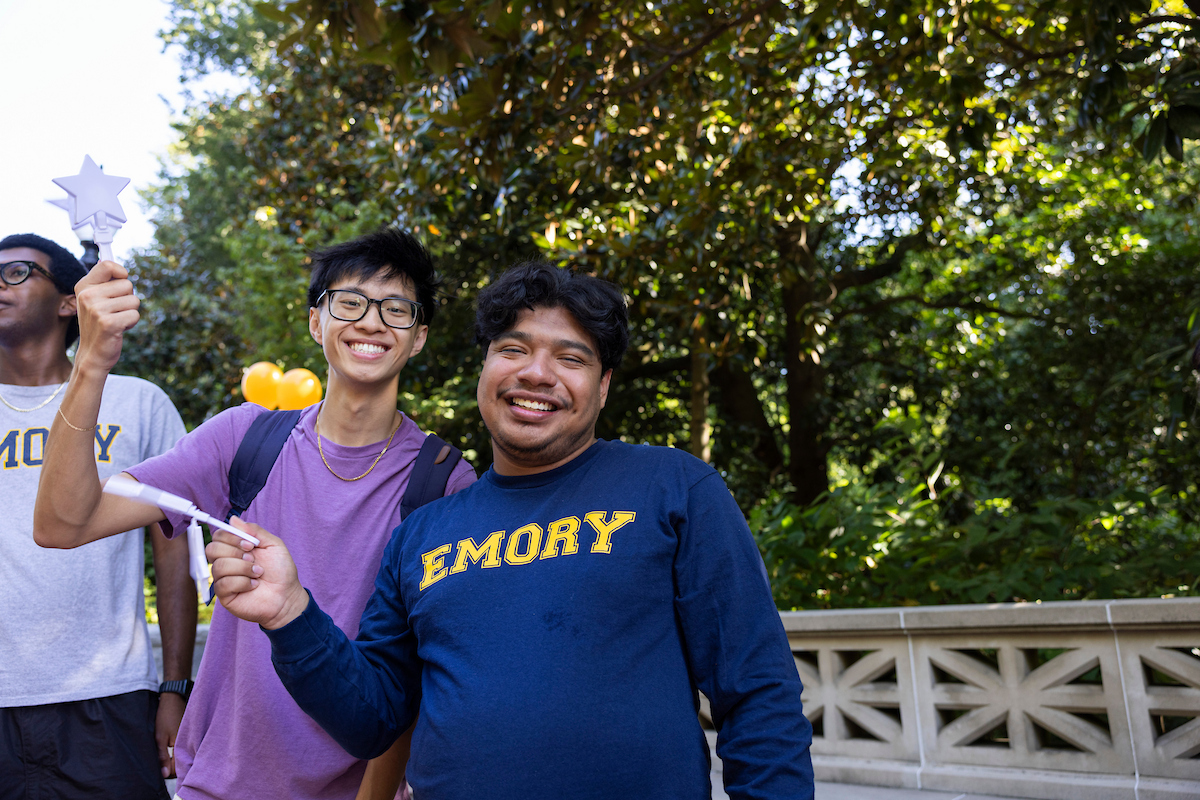Choosing a college is one of the most exciting, and sometimes overwhelming, decisions you'll make.…
Strong Personal Statements, Part 4: Be Authentic and Introspective

We’re sharing exceptional personal statements from last year’s applicants to illustrate that a good personal statement can be on a variety of topics, but ultimately, showcases the student’s character, curiosity, and voice. These statements, written by students now enrolled at Emory University, were selected for a multitude of reasons, and we asked our admission staff to share what made each statement stand out.
This is one of a 5-part series on application writing; read Part 1 here, Part 2 here, Part 3 here, and Part 5 here.
Some students have a background, identity, interest, or talent that is so meaningful they believe their application would be incomplete without it. If this sounds like you, then please share your story.
Gliding between chords, I disconnect from the audience and the band behind me, searching, not for perfection, but harmony. I’m playing Holst’s Jupiter, my dad sitting in the front row. He’s recording on his phone for future listening in chemotherapy sessions. Jazz trumpet has been part of my life for eight years, allowing me to be emotional and vulnerable. Improvisation is a method of examining and building back from missteps, a medium for examining my own misconceptions and struggles. Jazz allows me to be tender at times when I only want to harden over and shove through my agony.
When my dad got sick, he was hopeful and so was I. During his two-year brawl with his glioblastoma, he would reassure everyone we met that he would beat the cancer. He was adroit at fixing things. He taught himself everything from rewiring a portion of our house’s electrical system to fixing annealed glass octagonal windows. I watched in awe of my dad’s capabilities. Soon, his cancer began to take the father I once knew, and his actions and emotions were no longer his own. I was embarrassed and angry without anyone to be angry at. He couldn’t remember where he put his keys or when he repeated stories. He was quick to anger and despair. I watched in shock as his treatments failed day after day. I could not bear to watch him, a former marathon runner, lose control of his strong body, unable to speak or swallow his own saliva. Even with all his know-how, he couldn’t fix this problem and neither could I.
“Whatever doesn’t kill you makes you…” I couldn’t say.
In the months following his death, I searched for stories like my own. I found them in public figures I respected, like Sonia Sotomayor and Bill de Blasio, people who also lost parents at a young age. But I had a problem with these public narratives. Successful people tell stories of grief as if a parent’s death is just another rung in the ladder of their careers. Their sadness, they suggest, will eventually make them better, stronger, more adaptable.
What I have realized in the past few months is that the notion of what doesn’t kill you makes you stronger is mere apathy and coarseness in disguise. To tough it out was to stop caring about who I was and what my dad meant to me. I am a runner, a musician, a student, and a son. I see my dad in these parts of me because he inspired me to pursue them passionately. Instead of looking for healing in stories that weren’t mine, I looked for healing in what I did daily, what I knew.
To my left and right are an ocean of brightly colored singlets stretching along the start line for a mile. We’d all trained months for this moment. My dad inspired me to run cross country and track seven years ago, and it has been part of my daily life ever since. He too was a runner. After my dad’s death, I had a choice when I returned to running: I could view it as a test of strength or as a time of individual reflection. Running blurred my surroundings; like jazz, it was a means through which I could examine my own weaknesses and learn to carry my grief. I am perpetually moving my grief forward; stopping would be to ignore it. I run every day to maintain forward motion.
In the end, my dad couldn’t complete every project he started. In jazz improvisation, a solo is always incomplete because choosing one note means leaving out numerous others. I heal because my dad inspired in me the courage to choose the next note, even if it was the wrong one. The path forward I’ve chosen is one of delicate improvisation, searching for the perfect chord but not always finding it.
Feedback from Admission Staff
As we read applications, each student has a team of admission staff assigned to their file to review it and assess the student’s potential. The staff responsible for this student’s file had this to say about the personal statement:
After reading thousands of essays—and writing hundreds of my own—I understand how difficult it is to write about personal topics. Even now, I struggle to write personally and am in awe of individuals who know how to effectively communicate their sense of self through writing. If I could propose a formula for a well-written personal statement, it would be time + vulnerability + introspection. To write a personal statement, one must allocate enough time for introspection. Furthermore, the journey to introspection requires an openness to vulnerability. The personal statement above follows this formula perfectly.
Truly, this is a personal statement that has deeply embedded itself in both my mind and my heart. As an individual who, at a young age, lost my own father, I was able to empathize with this student. However, going beyond my ability to empathize, I was struck by the maturity that they exhibits through their writing. I am particularly appreciative of his desire to dispel apathy in the face of pain. As a young male, the author feels pressured to constantly be strong and dismissive of his emotions. In the end, though, he chooses to heal through his father’s memory and his devotion to jazz. Jazz provides the roots that connect him to his father, and like sheet music, every note builds, creating a powerful crescendo of love.
The author takes his audience along with him on a journey of never-ending vulnerability. The longevity of this journey is lifelong due to his recognition of the fact that his loss is not merely an obstacle to overstep. Rather than growing from it, he must learn to live by growing with it. This author taught me that, like jazz, improvisation in life is about the courage to take a step forward, even if it turns out to be the wrong choice. There is a natural optimism to this personal statement that I value. This student, like every other human being, is trying to figure life out, and admitting this exhibits a strong sense of maturity, honesty, and, of course, vulnerability.
I believe most students feel pressured to make their personal statement end on a note of optimism. I want the students reading this to know they do not have to force their tone into a direction of finality. We recognize our applicants are young, and a major part of youth is growing and having powerful experiences. While these experiences are unique to each student, a common thread of growth-potential accompanies every one. Therefore, I would encourage students to use the personal statement as a vessel for authentically defining their journey.
Don’t hesitate to connect with us by posting a comment to this blog, tweeting us @emoryadmission, or emailing us at admission@emory.edu. We look forward to hearing from you!



My essay is turning more into a story telling though my struggles and experiences are genuine. I am not table to show the real me inside the story. What’s your suggestion? Moreover since I am non native language learner somehow I feel like there is barrier between what I feel and how I express myself in the essay.
I was advice not to write about death in my personal statement essay, also not about divorce, drugs, and depression.
Hi Sarah,
Thank you for your comment. I believe the subject matter of your essay should be something that is meaningful to you. Choose your topic by how much the subject inspires you to write, and by how much of yourself is revealed through your storytelling. Any topic, treated carefully, can become an impactful essay. I wish you luck in your application writing!
-Jessica